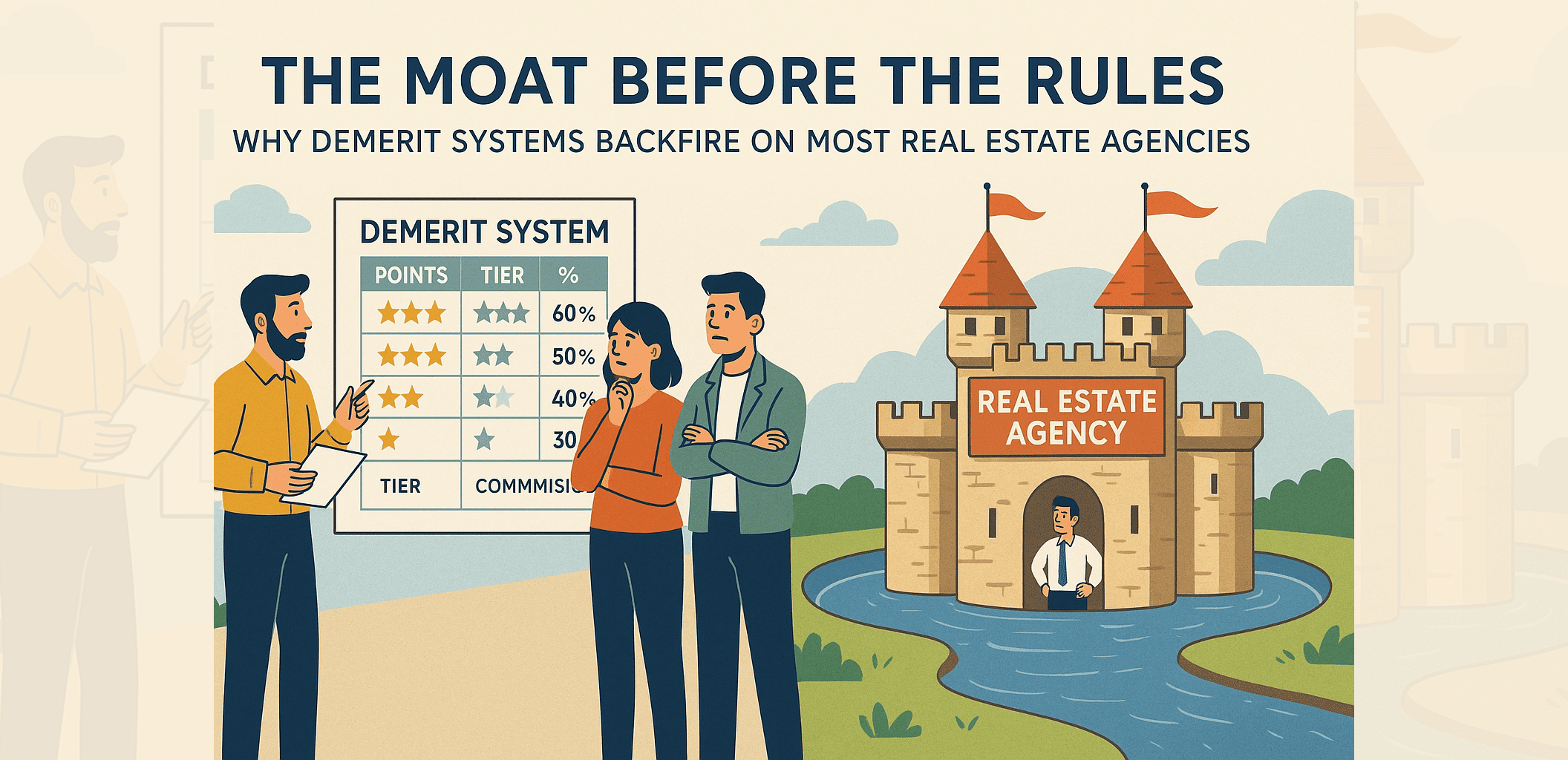The Moat Before the Rules: Why Demerit Systems Backfire on Most Real Estate Agencies

Many agency owners look at large, established real estate firms and see point systems that seem to work wonders. Agents earn points for achieving KPIs — listings secured, deals closed, team recruits, or training completed. They lose points for rule breaches — missed meetings, compliance errors, or poor conduct. In theory, these points lead to higher commission tiers or exclusive incentives.
It sounds structured. Motivational. Even fair. So, many smaller firms rush to implement similar systems — thinking it’ll bring discipline and performance.
But the result? The moment demerit points trigger a demotion or commission tier reset, top performers start looking for the exit. And suddenly, the agency is shocked:
“Why did my best agents leave? We were just trying to be more professional.”
The truth is simple: most agencies don’t have a moat. Without one, rules alone will only drive people away.
The “Moat” Problem: Why Big Agency Systems Fail for You
In Malaysia, agents can switch firms overnight. They’re not bound by long-term contracts or employment — they’re independent entrepreneurs. So if your firm offers nothing unique — no exclusive listings, no superior systems, no income advantage — they have no reason to tolerate penalties.
Big agencies succeed with tier and demerit systems because their agents have something to lose:
- Exclusive projects that are easy to sell
- High commission margins tied to those exclusives
- Technology and branding that accelerate sales
- Regional dominance where alternatives are limited
Without a moat, control mechanisms don’t work. They only highlight that the agent could do better elsewhere.
When a Point System Can Actually Work
A demerit or commission reset system isn’t wrong. It’s just context-dependent. It only works if your agency has built an ecosystem agents can’t easily walk away from.
Here’s when it makes sense:
-
You Have a Real Moat: You must offer something no one else can —
- Exclusive projects that are easy to close
- Strong developer relationships
- Technology that truly saves time or improves income
- Regional strength or brand power
-
You Offer Tangible Upside: Agents must feel rewarded — not restricted.
- Clear, meaningful commission upgrades
- Achievable KPI targets
- Incentives that grow income, not just titles
-
You Use It to Motivate, Not Punish
Points should feel like progress, not punishment. Build trust, not resentment. A performance system should show agents their growth, not remind them of their mistakes.
The High Cost of Blind Copying
When smaller agencies introduce “corporate-style” systems overnight — 10 demerit points for lateness, quarterly resets, and forced demotions — the outcome is almost always the same: top performers leave first.
Because top agents value autonomy. They interpret punishment as a signal that the agency doesn’t respect their independence. Without a moat, you’re enforcing discipline on people who owe you no loyalty. Worse — you’re driving away your most productive team members.
The 3 Questions Every Principal Should Ask
Before introducing any points, demotions, or tier resets, pause and reflect:
- Is my agency truly irreplaceable?
If agents can find similar listings, support, and payouts elsewhere, they’ll move the moment they feel restricted. - Does this system create value or control behavior?
Systems that reward performance build buy-in. Systems that punish deviation create rebellion. - Am I rewarding or punishing?
The best systems motivate — they don’t intimidate.
The Smarter Alternative: Build Before You Enforce
If you’re still growing your agency, start with value creation first:
- Introduce positive-only systems (reward KPIs without penalties).
- Build exclusive advantages — projects, leads, or tools.
- Use tier upgrades as motivation, not control.
- Delay any demerit or penalty system until your agency offers real, irreplaceable value.
Only when agents can’t afford to leave does discipline begin to work.
Case Example: The Wrong Timing
An agency implemented a quarterly commission reset:
- Miss your target once, drop a tier.
- Lose one deal, lose 5%.
Within two months, their top three closers walked out. Why? Because they could get the same 85% payout elsewhere — with no strings attached.
Their rule was sound. Their timing was wrong.
Final Thought: Build Value, Not Just Rules
Don’t copy the system without the substance.
The structure that works in a firm with a moat will collapse in one without it. Agents don’t stay because of penalties. They stay because leaving means losing something valuable. So before you enforce demotions, commission tier resets, or demerit points, ask:
“If I were an agent, what would make me stay after being punished?”
If you don’t have a good answer, it’s not time for rules — it’s time to build your moat.











































































































